
Chives, scientific name Allium schoenoprasum, is a species of flowering plant in the family Amaryllidaceae that produces edible leaves and flowers. Their close relatives include the common onions, garlic, shallot, leek, scallion, and Chinese onion.

Lilium is a genus of herbaceous flowering plants growing from bulbs, all with large prominent flowers. They are the true lilies. Lilies are a group of flowering plants which are important in culture and literature in much of the world. Most species are native to the Northern Hemisphere and their range is temperate climates and extends into the subtropics. Many other plants have "lily" in their common names, but do not belong to the same genus and are therefore not true lilies.

Asafoetida is the dried latex exuded from the rhizome or tap root of several species of Ferula, perennial herbs of the carrot family. It is produced in Iran, Afghanistan, Central Asia, northern India, and Northwest China (Xinjiang). Different regions have different botanical sources.

Passiflora foetida is a species of passion flower that is native to the southwestern United States, Mexico, the Caribbean, Central America, and much of South America. It has been introduced to tropical regions around the world, such as Southeast Asia, South Asia, Hawaii, Africa, and The Maldives. It is a creeping vine like other members of the genus, and yields an edible fruit. The specific epithet, foetida, means "stinking" in Latin and refers to the strong aroma emitted by damaged foliage.
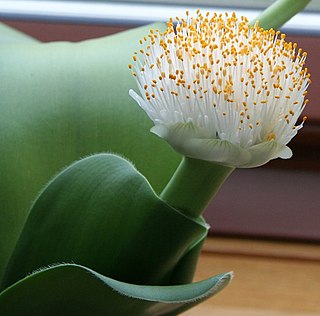
Haemanthus is a Southern African genus of flowering plants in the family Amaryllidaceae, subfamily Amaryllidoideae. Members of the genus are known as blood lily and paintbrush lily. There are some 22 known species, native to South Africa, Botswana, Namibia, Lesotho and Eswatini. About 15 species occur in the winter rainfall region of Namaqualand and the Western Cape, the remainder being found in the summer rainfall region, with one species Haemanthus albiflos occurring in both regions.
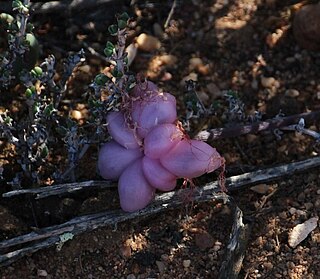
Haemanthus crispus is a South African bulbous geophyte in the genus Haemanthus and occurring in Namaqualand which lies in the winter rainfall region. It is a common species and is found from Steinkopf to the Olifants River, growing from the coastal flats eastwards onto the stony, lower slopes of the first terrace, usually in heavy soils and often in the shade of low succulent shrubs.

Albuca bracteata, is known by the common names pregnant onion, false sea onion, and sea-onion. It is a species of bulbous flowering plant in the family Asparagaceae. Its flowering stems can reach a height of 90 cm and can carry up to 100 greenish white flowers.
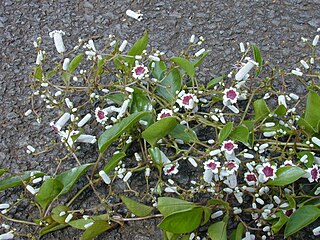
Paederia foetida is a species of plant, with common names that are variations of skunkvine, stinkvine, pilau maile (Hawaiian) or Chinese fever vine. It is native to temperate, and tropical Asia; and has become naturalized in the Mascarenes, Melanesia, Polynesia, and the Hawaiian Islands, also found in North America by recent studies.

Albuca is a genus of flowering plants in the family Asparagaceae, subfamily Scilloideae. The genus is distributed mainly in southern and eastern Africa, with some species occurring in northern Africa and the Arabian Peninsula. Plants of the genus are known commonly as slime lilies.

Albuca humilis is a bulbous flowering plant, placed in the genus Albuca in the subfamily Scilloideae of the family Asparagaceae. It is native to southern Africa – to South Africa from the Free State to KwaZulu-Natal according to some sources, or to the Drakensberg Mountains of Lesotho according to others.

Albuca shawii is a species of bulbous plant from southern Africa. It flowers in the summer and has yellow flowers on stems to about 30 cm high.

Albuca abyssinica, known in Tanzania by the common names koyosa and kitunguu pori, is a species of flowering plant in the family Asparagaceae, native to tropical regions in Africa. The flowers grow terminal racemes 20 – 30 cm long with the plant achieving heights between 60 and 100 cm. Its bulb has been used to treat inflammation and for dressing wounds.
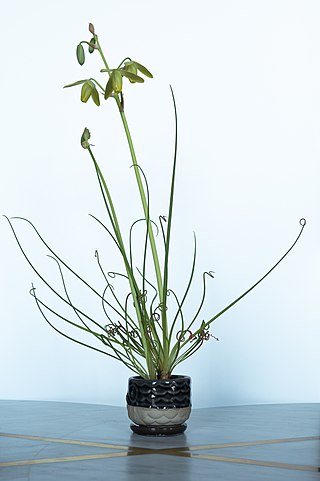
Albuca spiralis, commonly called the corkscrew albuca or frizzle sizzle, is a species of flowering plant in the family Asparagaceae, that is native to Western and Northern Cape Provinces, South Africa.

Drimia capensis ("Maerman") is a species of geophytic flowering plant in the family Asparagaceae, subfamily Scilloideae, indigenous to the south-western parts of South Africa.

Babiana dregei is a species of geophyte in the genus Babiana. It is endemic to the Northern Cape of South Africa, including Namaqualand.
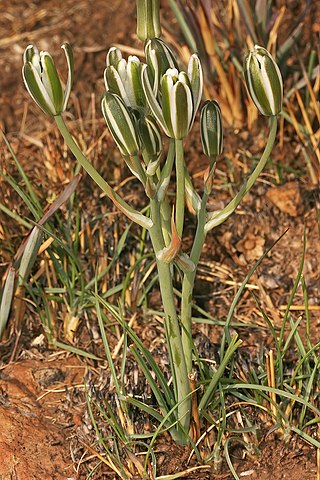
Albuca setosa is a species of small, perennial, bulbous plant in the asparagus family. It is native to the Cape Provinces and KwaZulu-Natal in South Africa.

Albuca cooperi is a species of small, perennial, bulbous plant in the asparagus family.

Albuca acuminata is a species of small, perennial, bulbous plant in the asparagus family. It is native to southern Africa from Namibia to the Cape Province of South Africa, where it occurs in rocky areas, as far east as Port Alfred.
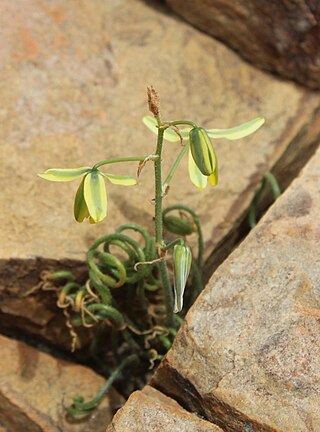
Albuca viscosa, commonly called the sticky albuca, is a species of flowering plant in the family Asparagaceae, that is native to Western and Northern Cape Provinces, South Africa.

Drimia media is a species of Drimia native to South Africa. It is a bulb plant like other Drimia species, such as Drimia platyphylla. It was described in 1799 by Jacq Willid.





















